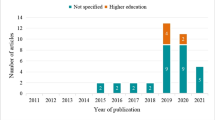Abstract
Researchers emphasize that prior knowledge is one of the important factors that influence learning. This study discusses the design and implementation of adapting an e-course to students’ prior knowledge using the Learning Management System (LMS). It aims to investigate the impact of such adaptive e-course to the learner’s prior knowledge through his or her achievement. To fulfill the study’s aim, a quasi-experimental approach was utilized. The study involved 130 students assigned randomly to two groups. An experimental group learned using an adaptive e-course while the other group was taught using traditional teaching methods. Findings of the study show that the experimental group outperformed the control group in academic achievement. The study also finds that activating relevant prior knowledge offered to the beginner learners helped in minimizing the performance gap between them and their advanced peers.


Similar content being viewed by others
References
Bransford, J. D., & Johnson, M. K. (1972). Contextual prerequisites for understanding: Some investigations of comprehension and recall. Journal of Verbal Learning and Verbal Behavior, 11(6), 717–726.
Brusilovsky, P. (2001). Adaptive hypermedia: User modeling and user adapted. Interaction, 11(1/2), 87–110.
Carpenter, S. K., Lund, T. J., Coffman, C. R., Armstrong, P. I., Lamm, M. H., & Reason, R. D. (2016). A classroom study on the relationship between student achievement and retrieval-enhanced learning. Educational Psychology Review, 28(2), 353–375.
Chen, C. H. (2014). An adaptive scaffolding e-learning system for middle school students’ physics learning. Australasian Journal of Educational Technology, 30(3), 342–355.
Dagger, D., Wade, V., & Conlan, O. (2005). Personalisation for all: Making adaptive course composition easy. Educational Technology & Society, 8(3), 9–25.
Dochy, F. J. (1996). Assessment of domain-specific and domain-transcending prior knowledge: Entry assessment and the use of profile analysis. In Alternatives in assessment of achievements, learning processes and prior knowledge (pp. 227-264). Springer Netherlands.
Dochy, F., Segers, M., & Buehl, M. M. (1999). The relation between assessment practices and outcomes of studies: The case of research on prior knowledge. Review of Educational Research, 69(2), 145–186.
Esichaikul, V., Lamnoi, S., & Bechter, C. (2011). Student modelling in adaptive e-learning systems. Knowledge Management & E-Learning: An International Journal, 3(3), 342–355.
Graf, S. (2007). Adaptivity in learning management systems focusing on learning (Doctoral dissertation, Vienna: Vienna university of technology faculty of informatics, 2007 (12)).
Jonassen, D. H., & Grabowski, B. L. (1993). Cognitive controls. Handbook of individual differences. Learning, and Instruction, London: Lawrence Erlbaum Associates.
Lee, J., & Park, O. (2008). Adaptive instructional systems. In J. M. Spector, M. D. Merrill, J. van Merrienboer, & M. P. Driscoll (Eds.), Handbook of research on educational communications and technology (3rd ed., pp. 469–484). New York: Lawrence Erlbaum.
Mödritscher, F., García-Barrios, V. M., & Gütl, C. (2004). Enhancement of SCORM to support adaptive E-learning within the scope of the research project AdeLE. In proceedings of E-Learn.
Mor, J., Conesa, J., Baneres, D., & Junyent, M. (2015). A semi-automated system for recognizing prior knowledge. International Journal of Emerging Technologies in Learning (iJET), 10(7), 23–30.
Murray, M. C., & Pérez, J. (2015). Informing and performing: A study comparing adaptive learning to traditional learning. DigitalCommons@ Kennesaw State University.
Song, H. S., Kalet, A. L., & Plass, J. L. (2016). Interplay of prior knowledge, self-regulation and motivation in complex multimedia learning environments. Journal of Computer Assisted Learning, 32(1), 31–50.
Tyton Partners (2013). Learning to adapt: A case for accelerating adaptive learning in higher education. [White Paper]. Available from http://tytonpartners.com/library/understanding-the-adaptive-learningsupplier-landscape/.
Wang, S. L., & Wu, C. Y. (2011). Application of context-aware and personalized recommendation to implement an adaptive ubiquitous learning system. Expert Systems with Applications, 38(9), 10831–10838.
Yang, T.-C., Hwang, G.-J., & Yang, S. J.-H. (2013). Development of an adaptive learning system with multiple perspectives based on students' learning styles and cognitive styles. Educational Technology & Society, 16(4), 185–200.
Author information
Authors and Affiliations
Corresponding author
Additional information
Publisher’s note
Springer Nature remains neutral with regard to jurisdictional claims in published maps and institutional affiliations.
Rights and permissions
About this article
Cite this article
Alsadoon, E. The impact of an adaptive e-course on students’ achievements based on the students’ prior knowledge. Educ Inf Technol 25, 3541–3551 (2020). https://doi.org/10.1007/s10639-020-10125-3
Received:
Accepted:
Published:
Issue Date:
DOI: https://doi.org/10.1007/s10639-020-10125-3




